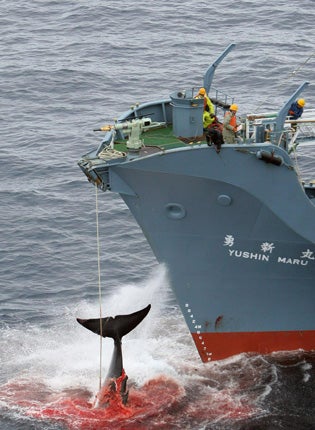Greenpeace pair found guilty of whale meat theft

It is a battle that has played out for years on the oceans; an annual game of cat and mouse between Japanese whalers and the environmentalists trying to disrupt their hunting season.
Yesterday, the latest round of the hard-fought struggle was played out in a Japanese courtroom where two Greenpeace activists were convicted for their part in trying to expose what they said was large-scale corruption in the country's whaling programme. The men – known as the "Tokyo Two"– were given suspended jail terms for taking a box of whale meat they said was being sold on the black market.
The convictions for trespass and theft were the latest sign of a backlash against the anti-whaling movement in Japan. A survey this week revealed that discounted whale meat is back on the menu at thousands of Japanese schools as stocks pile up around the country. Whale was served at least once last year at 5,355 primary and secondary schools – about 18 per cent of the 30,000 that offer lunches in Japan.
The two men, Junichi Sato, 33, and Toru Suzuki, 43, were arrested in 2008 after they took the 23kg box of meat, one of 47 allegedly sent by crew members aboard the whaling ship the Nisshin Maru to private addresses. According to Greenpeace, whalers aboard the ship have long had the right to choice cuts – worth hundreds of pounds – from the government-subsidised catch, which they sell on.
The two men called their one-year jail terms, suspended for three years, "disproportionate and unjust" after they were announced yesterday in Aomori, northern Japan. "It is saying that Japanese people don't have the right to expose corruption, which is guaranteed under international law," said Sato. "This case should have been about misuse of taxpayers' money and the rights of NGOs to investigate official wrongdoing." Greenpeace took the allegations to journalists before handing the meat to police in May 2008 and demanding an investigation. The authorities instead launched a ferocious campaign against the two men that culminated in their arrest and detention without lawyers for 26 days. During their trial, the pair admitted they took the meat, arguing it was in the public interest. But the three judges ruled yesterday that while there were "questionable" activities aboard the Nisshin Maru, that did not justify breaking the law.
The verdict follows the deportation in July of the New Zealand anti-whaling activist Peter Bethune, a member of the direct action group Sea Shepherd Conservation Society. Bethune was sentenced to two years, suspended for five, for assaulting a Japanese whaler during violent clashes in the Southern Ocean.
Another anti-whaler, Ric O'Barry, has been warned to stay away from Taiji village, the scene of a bloody annual dolphin hunt in southern Japan, which began this month. Mr O'Barry said he would not attend the hunt, but added that activists would increase their activities against whaling ahead of a November visit to Japan by US President Barack Obama.
But the former dolphin trainer, who arrived in Tokyo last week with a petition of 1.7 million signatures demanding the dolphin cull be stopped, admitted mounting global pressure on Japan may be having the opposite effect and persuading pro-whalers to dig their heels in. "It may be time to back off. That's one of the reasons I'm not there [in Taiji] this year. These hunts will only end when Japanese people get involved in this issue."
Greg McNevin, a Greenpeace spokesman, said the conviction of Suzuki and Sato would have a major impact on grassroots campaigns. "It will have a chilling effect on activists exposing wrongdoing in Japan," he said.
Japan's Fisheries Agency welcomed the verdict. "The two Greenpeace activists broke the law so they deserved their sentence," said a spokesman.
Join our commenting forum
Join thought-provoking conversations, follow other Independent readers and see their replies
Comments
Bookmark popover
Removed from bookmarks